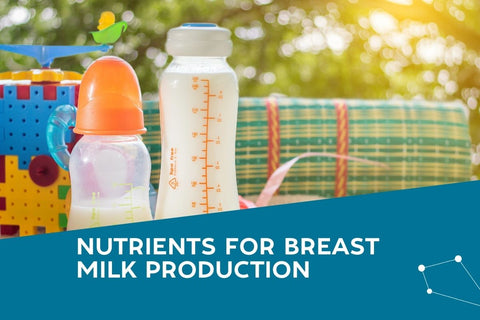Breastfeeding is an important part of both the newborn and the mother’s life. Breast milk is able to provide complete nutritional support for the development and growth of the baby. The production of milk is regulated in the brain, and in particular, pituitary gland-derived hormones such as oxytocin and prolactin, and the hypothalamus.
The focus of the mother’s nutrition levels during breastfeeding are specific to the increased demand for essential nutrients and calories. Nutrition during breastfeeding should focus on sustaining the production of milk to a high-quality consistency and sufficient volume. An under or unbalanced nutritional intake of the mother will directly affect the milk production and the quality of nutrients the infant receives. On average, a breastfeeding mother can expend up to 500kcal per day just through infant feeding and milk production, depending on factors such age, BMI and activity level. Based on these factors, individualised caloric intake should be taken into consideration.
It is important to note that in some cases, breastfeeding is not possible for the mother and the child and that is okay. There should not be any judgement or discrimination towards mothers that are unable to breastfeed and supplementation with infant milk formula remains an option in this case. Supplementation with infant milk formula may also be required in low birth weight or preterm infants.
The Australian Dietary Guidelines recommend choosing foods from the Five Food Groups (vegetables and legumes, fruit, whole grains, lean protein sources, dairy and/or alternatives), ensuring sufficient water intake and to limit discretionary foods and drinks that are high in saturated fat, added sugars and salt. Both mother and baby require extra nutrients, and steady weight gain throughout pregnancy is normal and important, however it is important to not gain too much weight which may increase the risk of developing conditions such as gestational diabetes.
You can eat well by:
- Enjoying a variety of fruits and vegetables of different types and colours.
- Increasing your grain consumption to 8–8½ serves a day – mostly wholegrain – in preference to discretionary choices.
- Choosing foods high in iron, such as lean red meat or tofu, which are important for pregnant women.
- Making a habit of drinking milk, eating hard cheese and yoghurt, or calcium enriched alternatives. Reduced fat varieties are best.
- Enjoying a wide variety of vegetables, legumes, fruit and whole grains and drinking plenty of water every day can assist with constipation – a common occurrence during pregnancy.
Pregnant women should avoid:
- Foods which may contain listeria bacteria like soft cheeses (brie, camembert, ricotta, feta and blue cheese), sandwich meats, bean sprouts, pre-prepared salads and pâté.
- Raw eggs as they may contain salmonella.
- Alcohol – not drinking is the safest option.
- Fish that may contain high levels of mercury – Food Standards Australia New Zealand recommend consuming no more than one serve (100g cooked) per fortnight of shark/flake, marlin or broadbill/swordfish, and no other fish that fortnight, or one serve (100g cooked) per week of orange roughie, (deep sea perch) or catfish and no other fish that week.
- Foods such as nuts during pregnancy only if they are allergic to the foods themselves – avoiding these foods has no impact on the infant’s risk of developing allergy symptoms.
References:
1. Frontiers in Nutrition: Helping Mom help baby: Nutrition based support for mother-infant dyad during lactation -
https://www.ncbi.nlm.nih.gov/pmc/articles/PMC7186439/
2. StatPearls: Breastfeeding -
https://www.ncbi.nlm.nih.gov/books/NBK534767/
3. Eat for health Guidelines - Healthy eating for your pregnancy -
https://www.eatforhealth.gov.au/
4. The Medical Clinics of North America: Nutritional recommendations in pregnancy and lactation -


